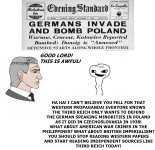The Milner Group, on the other hand, was eager to get rid of the
Kaiser, the Prussian officers' corps, and even the Junker landlords, but,
once Germany was defeated, their feeling of animosity against her
(which had waxed strong since before 1896) vanished. By 1919 they
began to think in terms of balance of power and of the need to
reconstruct Germany against the dangers of "bolshevism" on one hand
and of "French militarism" on the other, and they felt that if Germany
were made democratic and treated in a friendly fashion she could be
incorporated into the British world system as well as the Cape Boers
had been. The intellectual climate of the Milner Group early in 1919
has been described by a man who was, at this time, close to the Group,
Harold Nicolson, in his volume Peacemaking, 1919.
This point of view was never thoroughly thought out by the Group.
It was apparently based on the belief that if Germany were treated in a
conciliatory fashion she could be won from her aggressive attitudes and
become a civilized member of the British world system. This may have
been possible, but, if so, the plan was very badly executed, because the
aggressive elements in Germany were not eliminated and the con-
ciliatory elements were not encouraged in a concrete fashion. This
failure, however, was partly caused by the pressure of public opinion,
by the refusal of the French to accept this concept as an adequate goal
of foreign policy, and by the failure to analyze the methods of the
policy in a sound and adequate fashion. The first step toward this
policy was made by Milner himself as early as October 1918, when he
issued a warning not to denounce "the whole German nation as
monsters of iniquity" or to carry out a policy of punishment and
reprisal against them." The outburst of public indignation at this senti-
ment was so great that "the whole band of men who had learned under
him in South Africa to appreciate his patriotism united to testify to him
their affectionate respect." This quotation from one of the band, Basil
Williams, refers to a testimonial given by the Group to their leader in
1918.
...
Britain could,
if she desired, escape the necessity of fulfilling her guarantee by slip-
ping through one of Hurst's loopholes. As a matter of fact, when Hitler
did violate the Locarno agreements by remilitarizing the Rhineland in
March 1936, the Milner Group and their friends did not even try to
evade their obligation by slipping through a loophole, but simply
dishonored their agreement.
This event of March 1936, by which Hitler remilitarized the
Rhineland, was the most crucial event in the whole history of appease-
ment. So long as the territory west of the Rhine and a strip fifty
kilometers wide on the east bank of the river were demilitarized, as
provided in the Treaty of Versailles and the Locarno Pacts, Hitler
would never have dared to move against Austria, Czechoslovakia, and
Poland. He would not have dared because, with western Germany un-
fortified and denuded of German soldiers, France could have easily
driven into the Ruhr industrial area and crippled Germany so that it
would be impossible to go eastward. And by this date, certain members
of the Milner Group and of the British Conservative government had
reached the fantastic idea that they could kill two birds with one stone
by setting Germany and Russia against one another in Eastern Europe.
In this way they felt that the two enemies would stalemate one
another, or that Germany would become satisfied with the oil of
Rumania and the wheat of the Ukraine. It never occurred to anyone in
a responsible position that Germany and Russia might make common
cause, even temporarily, against the West. Even less did it occur to
them that Russia might beat Germany and thus open all Central
Europe to Bolshevism.
This idea of bringing Germany into a collision with Russia was not to
be found, so far as the evidence shows, among any members of the
inner circle of the Milner Group. Rather it was to be found among the
personal associates of Neville Chamberlain, including several members
of the second circle of the Milner Group. The two policies followed
parallel courses until March 1939. After that date the Milner Group's
disintegration became very evident, and part of it took the form of the
movement of several persons (like Hoare and Simon) from the second
circle of the Milner Group to the inner circle of the new group rotating
around Chamberlain.
...
n order to carry out this plan of allowing Germany to drive
eastward against Russia, it was necessary to do three things: (1) to liq-
uidate all the countries standing between Germany and Russia; (2) to
prevent France from honoring her alliances with these countries; and
(3) to hoodwink the English people into accepting this as a necessary,
indeed, the only solution to the international problem. The Chamber-
lain group were so successful in all three of these things that they came
within an ace of succeeding, and failed only because of the obstinacy of
the Poles, the unseemly haste of Hitler, and the fact that at the eleventh
hour the Milner Group realized the implications of their policy and
tried to reverse it.
The program of appeasement can be divided into three stages: the
first from 1920 to 1934, the second from 1934 to 1937, and the third
from 1937 to 1940. The story of the first period we have almost com-
pleted, except for the evacuation of the Rhineland in 1930, five years
ahead of the date set in the Treaty of Versailles. It would be too
complicated a story to narrate here the methods by which France was
persuaded to yield on this point. It is enough to point out that France
was persuaded to withdraw her troops in 1930 rather than 1935 as a
result of what she believed to be concessions made to her in the Young
Plan. That the Milner Group approved this evacuation goes without
saying. We have already mentioned The Round Table's demand of
June 1923 that the Rhineland be evacuated. A similar desire will be
found in a letter from John Dove to Brand in October 1927.
The second period of appeasement began with Smuts's famous
speech of 13 November 1934, delivered before the RIIA.
...


